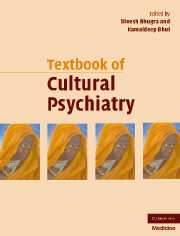Book contents
- Frontmatter
- Contents
- Contributors
- Foreword
- Preface
- Part I Theoretical background
- Part II Culture and mental health
- Part III Culture and mental disorders
- Part IV Theoretical aspects of management
- Part V Management with special groups
- 35 Intellectual disabilities across cultures
- 36 Child psychiatry across cultures
- 37 Management of sexual dysfunction across cultures
- 38 Refugees and mental health
- 39 Working with elderly persons across cultures
- 40 Working in liaison psychiatry
- Part VI Cultural research and training
- Cultural psychiatry: the past and the future
- Index
- References
38 - Refugees and mental health
from Part V - Management with special groups
Published online by Cambridge University Press: 11 August 2009
- Frontmatter
- Contents
- Contributors
- Foreword
- Preface
- Part I Theoretical background
- Part II Culture and mental health
- Part III Culture and mental disorders
- Part IV Theoretical aspects of management
- Part V Management with special groups
- 35 Intellectual disabilities across cultures
- 36 Child psychiatry across cultures
- 37 Management of sexual dysfunction across cultures
- 38 Refugees and mental health
- 39 Working with elderly persons across cultures
- 40 Working in liaison psychiatry
- Part VI Cultural research and training
- Cultural psychiatry: the past and the future
- Index
- References
Summary
EDITORS' INTRODUCTION
The number of individuals being pushed out of their countries on the basis of their religion or political persecution has increased dramatically in the last couple of decades. With changes in immigration laws across several West European countries, the rules have become tighter and countries less welcoming of refugees as well as of migrants. The trauma of separation and cultural differences in the new settings contribute to stress. Other factors, such as religion, language and poor housing, combined with unemployment, make individuals even more isolated. Psychological distress will be influenced by pre-existing experiences and personality traits. Torture and physical violence may add to vulnerability. In addition to persecution, refugees and asylum seekers have to deal with a series of losses, only some of which are material. Loss of status and emotional loss related to social networks, family and friends add to the stress. Feeling unwelcome in the new country further contributes to poor self-regard and a sense of alienation. This sense of alienation, along with previous experiences of persecution, makes the individual vulnerable.
In this chapter, Warfa and Bhui suggest that depression, suicidality and post-traumatic stress disorder are leading psychiatric morbidities in this population. On the other hand, it has been argued that the impact of trauma should not be medicalized and understood in the context of their cultural experiences. The protective factors against developing depression include employment, personal and social networks and resources. There is little doubt that discrimination and racism may further contribute to external stressors. These insidious and sometimes overt actions may break the individual's resilience and, combined with denying access to health and social care, may lead to psychiatric disorders.
- Type
- Chapter
- Information
- Textbook of Cultural Psychiatry , pp. 503 - 511Publisher: Cambridge University PressPrint publication year: 2007
References
- 2
- Cited by



